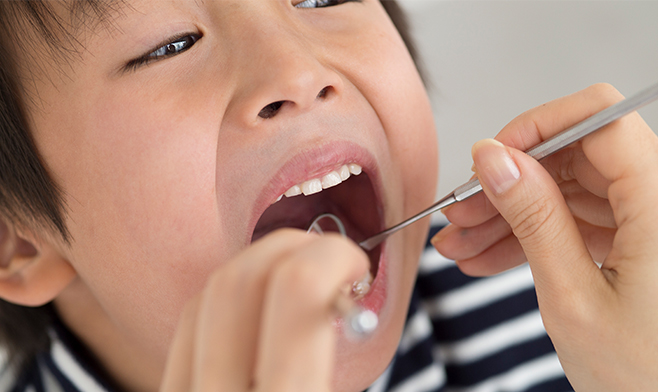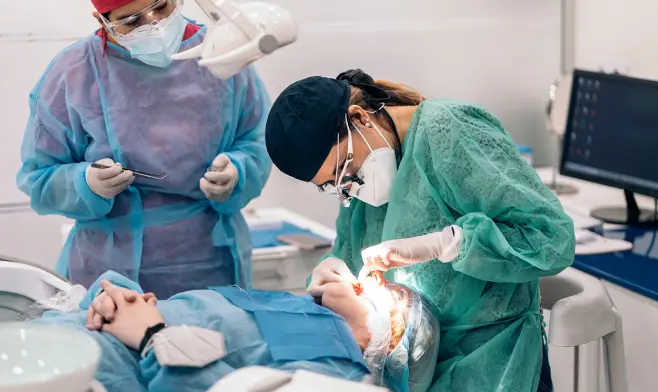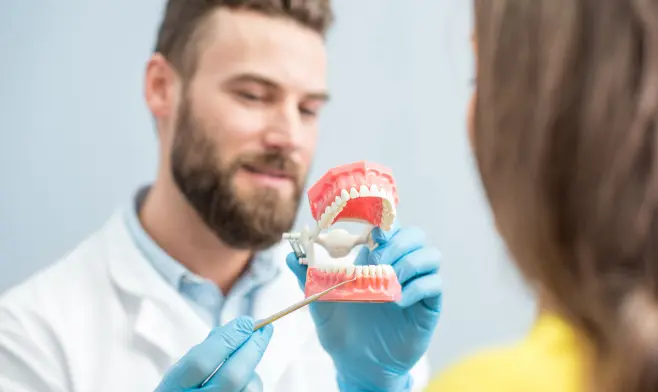Juvenile periodontitis, also known as aggressive periodontitis, early-onset periodontitis, or juvenile gum disease, is a rare and severe form of periodontal disease that affects children and young adults. It is characterized by a rapid progression of gum and bone destruction, leading to tooth loss if left untreated.
Here’s everything you need to know about juvenile periodontitis, including causes, symptoms, bacterial links, and treatment.
What is Periodontitis?
Periodontitis, also known as periodontal disease or gum disease, is a severe and advanced stage of gum inflammation. It is a chronic bacterial infection that affects the tissues surrounding and supporting the teeth, including the gums, periodontal ligament, and alveolar bone. To learn about the clinician who leads our advanced periodontal practice and his patient-care philosophy, click to meet our San Diego periodontist.
Typically, the accumulation of plaque, a sticky film of bacteria that forms on the teeth and gums, causes the condition. If plaque is not effectively removed through proper oral hygiene practices such as brushing, flossing, and regular dental cleanings, it can harden into tartar (calculus), which provides a conducive environment for bacteria to thrive.
As the bacteria grow, they produce toxins that irritate the gums, leading to inflammation, which is known as gingivitis. Gingivitis is characterized by red, swollen, and bleeding gums and, if left untreated, can progress into periodontitis.
What Causes Juvenile or Aggressive Periodontitis?
The exact causes of juvenile or aggressive periodontitis are not yet fully understood. However, research suggests that several factors may contribute to the development of these conditions. These factors include:
- Genetic predisposition: Certain individuals may be more genetically susceptible to developing juvenile or aggressive periodontitis. Genetic factors can influence the body’s immune response, making some individuals more prone to severe gum infections and bone loss.
- Bacterial infections and specific pathogens: Periodontitis is primarily caused by the accumulation of plaque, a sticky film of bacteria that forms on the teeth and gums. One particularly aggressive bacterium, Aggregatibacter actinomycetemcomitans, is often found in cases of juvenile periodontitis.
- Impaired immune response: People with compromised immune systems, either due to genetic factors or underlying medical conditions, may be more susceptible to severe forms of periodontitis. An impaired immune response makes it harder for the body to fight off bacterial infections and control inflammation.
- Smoking and other lifestyle factors: Smoking tobacco has been linked to an increased risk of developing aggressive periodontitis. Other lifestyle factors, such as poor nutrition and high-stress levels, may also contribute to the progression of these conditions.
What Are the Clinical Signs of Juvenile Periodontitis?
The disease typically begins around puberty and may affect the molars and incisors (front teeth) first. Unlike the more common form of periodontitis seen in adults, individuals with juvenile periodontitis often have minimal visible plaque, making it distinct and challenging to diagnose.
Signs and symptoms of juvenile periodontitis include:
- Red, swollen, and bleeding gums
- Bad breath (halitosis)
- Gums that are tender and painful to touch
- Receding gums, making the teeth appear longer
- Formation of deep periodontal pockets
- Loose teeth or teeth that are separating
- Bite changes or malocclusion
- Discomfort or pain while chewing
- Pus between the teeth and gums
- Early tooth loss in teens or young adults
How is Juvenile Periodontal Disease Treated?
If the disease is discovered at a very early stage, treatment can include subgingival scaling and root planing in conjunction with antibiotic therapy. If conservative treatment does not result in a resolution of the disease process, your dentist may switch to surgical therapy.
Surgical treatment would involve flap elevation of the affected areas, followed by thorough root debridement. Commonly, a bone graft procedure such as osseous regenerative therapy is used to treat the lesions. This would all help to control the infection, remove diseased tissue, and regenerate lost bone and gum tissue.
Your periodontist may also recommend targeted antibiotics based on lab analysis of the bacteria present in your child’s mouth.
How is Juvenile Periodontal Disease Prevented?
If gum disease runs in your family, it’s very important to have your child have a routine dental checkup as well as great home care because the disease tends to cause very rapid bone loss if untreated.
Other tips for prevention include:
- Practice good oral hygiene: Brush your teeth at least twice a day with fluoride toothpaste. Make sure to clean all tooth surfaces, including the gumline. Additionally, floss daily to remove plaque and debris from between the teeth and along the gumline.
- Visit the dentist regularly: Regular dental check-ups and professional cleanings are essential for monitoring your oral health. Dentists can detect early signs of gum disease, provide necessary treatments, and offer guidance on oral hygiene techniques. The frequency of dental visits may vary depending on your specific needs, but it is generally recommended to have a check-up every six months.
- Eat a balanced diet: Proper nutrition plays a vital role in maintaining healthy gums and teeth. Include a variety of fruits, vegetables, whole grains, lean proteins, and low-fat dairy products in your diet. Limit sugary and acidic foods and beverages, as they can contribute to tooth decay and gum problems.
- Ask your dentist about early screening if there’s a family history of periodontitis.
Unfortunately, in many cases, juvenile periodontitis does not show any symptoms, so a thorough dental exam is essential. Start by seeing your general dentist; then, depending on how severe your periodontitis is, your dentist may refer you to see Dr. Khansari for periodontitis treatment.
Here at Poway Perio, we are happy to help you fight juvenile periodontitis and get your teeth and gums back to good health with regular periodontal maintenance. If you have more questions or would like to book a consultation, we’re happy to discuss your individual situation. Just give us a call at 858-679-0142.
Juvenile Periodontitis FAQs
What is juvenile periodontitis?
Juvenile periodontitis is a rare, aggressive form of gum disease that causes rapid bone loss in teens and young adults, often without obvious symptoms.
What causes juvenile periodontitis?
It’s often linked to specific bacteria like A. actinomycetemcomitans, genetic factors, and a poor immune response.
Is juvenile periodontitis the same as aggressive periodontitis?
Yes, they are often used interchangeably, but some clinicians use “aggressive” as a broader category that includes juvenile onset.
What bacteria are associated with juvenile periodontitis?
The most common is Aggregatibacter actinomycetemcomitans, though others may be present in advanced cases.
How do you treat aggressive periodontitis in young people?
Treatment includes deep cleanings, antibiotics, possible surgery, and close maintenance.





